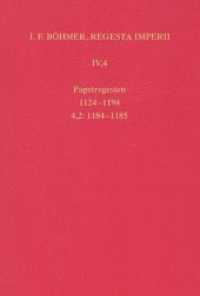- ホーム
- > 洋書
- > ドイツ書
- > Humanities, Arts & Music
- > Religion & Theology
- > christianity
Full Description
In the texts of Genesis 18 and 32, God appears to a patriarch in person and is referred to by the narrator as a man, both times by the Hebrew word īsh. In both texts, God as īsh is described in graphically human terms. This type of divine appearance is identified here as the "īsh theophany". The phenomenon of God appearing in concrete human form is first distinguished from several other types of anthropomorphism, such as divine appearance in dreams. The īsh theophany is viewed in relation to appearances of angels and other divine beings in the Bible, and in relation to anthropomorphic appearances of deities in Near Eastern literature. The īsh theophany has implications for our understanding of Israelite concepts of divine-human contact and communication, and for the relationship to Ugaritic literature in particular. The book also includes discussion of philosophical approaches to anthropomorphism. The development of philosophical opposition to anthropomorphism can be traced from Greek philosophy and early Jewish and Christian writings through Avicenna, Averroes, Maimonides and Aquinas, and into the work of later philosophers such as Hume and Kant. However, the work of others can be applied fruitfully to the problem of divine anthropomorphism, such as Wittgenstein's language games.







